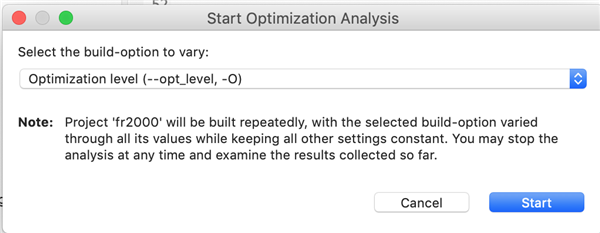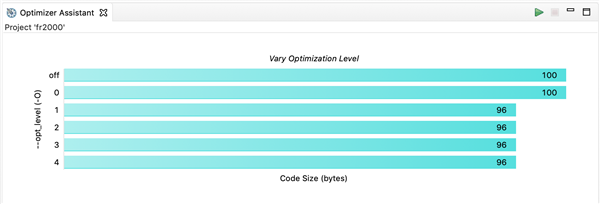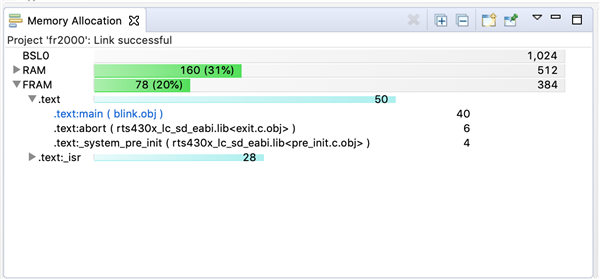Tool/software: Code Composer Studio
I am trying to program an MSP430FR2000 using CCS Version: 9.1.0.00010. I'm building a simple program I downloaded from the forum to get started. I'm getting the following error:
error #10099-D: program will not fit into available memory. placement with alignment fails for section "ALL_FRAM" size 0x1f0 . Available memory ranges:
FRAM size: 0x180 unused: 0x180 max hole: 0x180
Below is the code:
#include <msp430.h>
#include <stdint.h>
// #defines for simple communication protocol
#define READ 0
#define WRITE 1
// Global variables
uint8_t command, data, byteCount;
// Function prototypes
void UART_sendByte(uint8_t txByte);
int main(void)
{
WDTCTL = WDTPW | WDTHOLD; // Stop WDT
byteCount = 0; // Initialize byteCount
// Configure Comparator input & output
P1DIR = 0xFF;
P1OUT = 0x00;
P2DIR = 0xFF;
P2OUT = 0x00;
PADIR = 0xFF;
PAOUT = 0x00;
P1SEL0 = BIT1 | BIT2 | BIT3; // Select eCOMP input function on P1.1/C1, UCA0 RXD and TXD
P1SEL1 = BIT1;
P2DIR = BIT0;
P2SEL1 = BIT0 | BIT6 | BIT7; // Select CPOUT function on P2.0/COUT, P2.6~P2.7: crystal pins
PM5CTL0 &= ~LOCKLPM5; // Disable the GPIO power-on default high-impedance mode
// to activate previously configured port settings
// Initialize crystal
//do
//{
// CSCTL7 = 0; // Clear XT1 fault flag
// SFRIFG1 = 0; // Clear fault flag
//} while (SFRIFG1 & OFIFG); // Test oscillator fault flag
//CSCTL4 = SELA__XT1CLK; // Set ACLK = XT1CLK = 32768Hz
// Configure UART
// From user's Guide Table of Baud Rates, 9600 baud at BRCLK = 32768
// UCOS16 = 0
// UCBRx = 3
// UCBRFx = 0
// UCBRSx = 0x92
UCA0CTLW0 = UCSWRST | UCSSEL__ACLK;
UCA0BRW = 3;
UCA0MCTLW = 0x9200;
UCA0CTLW0 &= ~UCSWRST; // Initialize eUSCI
UCA0IE = UCRXIE; // Enable USCI_A0 RX interrupt
// Setup eCOMP
CPCTL0 = CPPSEL0; // Select C1 as input for V+ terminal
CPCTL0 |= CPNSEL1 | CPNSEL2; // Select DAC as input for V- terminal
CPCTL0 |= CPPEN | CPNEN; // Enable eCOMP input
CPDACCTL = CPDACEN; // eCOMP output is selected as the buffer control source
CPDACDATA = 0x1030; // CPDACBUF1=VCC *3/4 CPDACBUF2=VCC *1/4
CPCTL1 |= CPEN | CPMSEL; // Turn on eCOMP, in low power mode
while(1)
{
__bis_SR_register(LPM3_bits | GIE); // Go to LPM3 with interrupts
__no_operation();
// Process received byte
// Note that byteCount is always incremented by 2. This allows
// __even_in_range usage for space-saving compiler optimization.
// See SLAU132 for more info.
switch(__even_in_range(byteCount,6))
{
case 2: // 1st byte received
command = data; // 1st byte is always command byte
if(command == READ) // Read Command
{ // Send response.
UART_sendByte(CPDACDATA_H); // Send the current DAC value
UART_sendByte(CPDACDATA_L);
byteCount = 0; // No further bytes to receive for READ
}
break;
case 4: // 2nd byte received
if(command == WRITE)
CPDACDATA_H = data;
break;
case 6: // 3rd byte received
if(command == WRITE)
CPDACDATA_L = data;
if(byteCount >= 6) // Check if all bytes received
byteCount = 0; // WRITE TIME command complete
break;
default: break;
}
}
}
// Function for sending UART byte via polling method
void UART_sendByte(uint8_t txByte)
{
while(!(UCA0IFG & UCTXIFG)); // Check if ready to TX
UCA0TXBUF = txByte; // Send the data byte
}
// UART interrupt service routine
#pragma vector=USCI_A0_VECTOR
__interrupt void USCI_A0_ISR(void)
{
data = UCA0RXBUF; // Read the byte
// Note that byteCount is always incremented by 2. This allows
// __even_in_range usage in main() for space-saving compiler optimization.
// See SLAU132 for info.
byteCount+=2; // Increment byte
__bic_SR_register_on_exit(LPM3_bits); // Wake from LPM
}
Below is the complete output from the build
**** Build of configuration Debug for project test ****
"C:\\ti\\ccs910\\ccs\\utils\\bin\\gmake" -k -j 8 all -O
Building file: "../main.c"
Invoking: MSP430 Compiler
"C:/ti/ccs910/ccs/tools/compiler/ti-cgt-msp430_19.6.0.STS/bin/cl430" -vmspx --use_hw_mpy=none --include_path="C:/ti/ccs910/ccs/ccs_base/msp430/include" --include_path="C:/Users/ryan.rogel/Documents/CCS/workspace/test" --include_path="C:/ti/ccs910/ccs/tools/compiler/ti-cgt-msp430_19.6.0.STS/include" --advice:power=all --advice:hw_config=all --define=__MSP430FR2000__ -g --printf_support=minimal --diag_warning=225 --diag_wrap=off --display_error_number --silicon_errata=CPU21 --silicon_errata=CPU22 --silicon_errata=CPU40 --preproc_with_compile --preproc_dependency="main.d_raw" "../main.c"
"../main.c", line 148: remark #1528-D: (ULP 3.1) Detected flag polling using UCA0IFG. Recommend using an interrupt combined with enter LPMx and ISR
Finished building: "../main.c"
Building target: "test.out"
Invoking: MSP430 Linker
"C:/ti/ccs910/ccs/tools/compiler/ti-cgt-msp430_19.6.0.STS/bin/cl430" -vmspx --use_hw_mpy=none --advice:power=all --advice:hw_config=all --define=__MSP430FR2000__ -g --printf_support=minimal --diag_warning=225 --diag_wrap=off --display_error_number --silicon_errata=CPU21 --silicon_errata=CPU22 --silicon_errata=CPU40 -z -m"test.map" --heap_size=160 --stack_size=160 --cinit_hold_wdt=on -i"C:/ti/ccs910/ccs/ccs_base/msp430/include" -i"C:/ti/ccs910/ccs/tools/compiler/ti-cgt-msp430_19.6.0.STS/lib" -i"C:/ti/ccs910/ccs/tools/compiler/ti-cgt-msp430_19.6.0.STS/include" --reread_libs --diag_wrap=off --display_error_number --warn_sections --xml_link_info="test_linkInfo.xml" --use_hw_mpy=none --rom_model -o "test.out" "./main.obj" "../lnk_msp430fr2000.cmd" -llibc.a
<Linking>
"../lnk_msp430fr2000.cmd", line 132: error #10099-D: program will not fit into available memory. placement with alignment fails for section "ALL_FRAM" size 0x1f0 . Available memory ranges:
FRAM size: 0x180 unused: 0x180 max hole: 0x180
error #10010: errors encountered during linking; "test.out" not built
>> Compilation failure
makefile:141: recipe for target 'test.out' failed
gmake[1]: *** [test.out] Error 1
makefile:137: recipe for target 'all' failed
gmake: *** [all] Error 2
**** Build Finished ****








